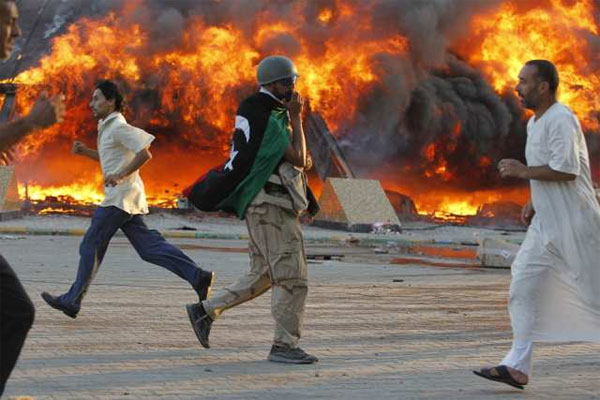
From Max Boot, the Los Angeles Times: [T]here remains a real danger of catastrophe, a la post-Taliban Afghanistan and post-Saddam Hussein Iraq, which each succumbed to chaos after the ouster of their dictators. To avert such a dire outcome, the North Atlantic Treaty Organization, or failing that, the U.N., will have to offer economic assistance, expert advice and, most likely, peacekeeping troops.
At a minimum, an outside stabilization force will be needed to prevent government weapons stockpiles, including reported stores of mustard gas and other potential weapons of mass destruction, from falling into the wrong hands. Already there are reports of some of Kadafi’s portable antiaircraft missiles being looted; if they find their way to the global arms market, the likelihood of their use by terrorists against civilian airliners rises. A stabilization force would also give the Transitional National Council time to train and stand up its own security forces.
There is little appetite in the United States for another commitment of ground troops, which is why it will be important for European, African and Arab allies to carry the bulk of the peacekeeping burden.
Some may argue that an international stabilization force — which means sending foreign troops into Libya — risks replaying the key mistake of the Iraq war. But that depends on what you think the mistake was. Was it the very presence of U.S. troops that sparked that insurgency? There probably would have been Sunni Muslim resistance to a Shiite-dominated regime in any case. What allowed the situation to spin out of control was that the U.S. disbanded the Iraqi security forces and did not send enough of its own troops to fill the vacuum.
By contrast, post-conflict scenarios in Bosnia, Kosovo and East Timor worked out better, because in all three places there was a substantial deployment of international peacekeepers early on. None of those countries is paradise, but all are more peaceful than Iraq or Afghanistan, and they offer a better model for revolutionary Libya — and its allies. If NATO refuses to send a peacekeeping force (as looks likely at the moment), and if the U.N. doesn’t step up, there is a real risk of Libya becoming a failed state.
Max Boot is a contributing editor to Opinion and a senior fellow at the Council on Foreign Relations. (photo: Louafi Larbi/Reuters)
Image: reuters%208%2024%2011%20Gaddafi%20compound.jpg

